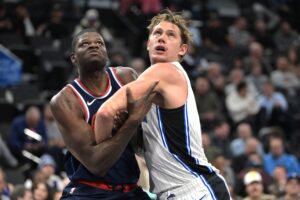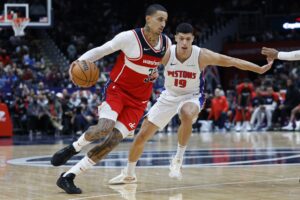Sometimes, there aren’t enough minutes to go around. The Sacramento Kings have a lineup full of young talent mixed in with veteran players, and the rotation favors the younger guys. Players like De’Aaron Fox, Frank Mason III, Justin Jackson, and Harry Giles are all in their first year. In contrast, the veteran players like Vince Carter, Zach Randolph, and George Hill have been playing for nine or more years. The interesting point here is between those sets of players, the majority of the roster is first- and second-year players. Sacramento’s roster shows so much potential for the future, but it currently has an issue with playing time. The most common starters this season are Fox, Hill, Skal Labissiere, Randolph, and Garrett Temple. With such a versatile starting five and reserves, the Kings are in a good position to be contenders down the road. However, are they playing the younger guys too much right now?
Sacramento Kings Rotation: Minutes vs. Experience
Rookie Rotation
Annual coverage of the NBA Draft consists of the same few questions. Is the player NBA-ready? Can this player produce in his rookie year? These questions are basic but can help teams decide who will be good right now, and who will take a few years to get there. The Kings have plenty of right now talent and future talent but all of those guys are playing high minutes on a somewhat below average team. Currently sitting at 11-20, the Kings have shown spurts of great play, but nothing resembling a finished product. The emergence of Fox as a starter comes naturally as he was selected fifth overall in the draft. His starting job makes sense, but at what cost?
Minutes vs. Experience
What’s better? A rookie starting and averaging high minutes, or that rookie coming in off the bench at specific times to boost the second unit? There are coaches who would say a starting job gives more experience and is the only way for players to progress. The counter to this is Ben Simmons of the Philadelphia 76ers. He sat out the entire 2016-17 season and is now the favorite to win Rookie of the Year this season. Zero minutes on the court last year, yet he already looked like a pro after his first few games. The experience does come from minutes on the court, but those minutes need to be during important stretches. A team needs crafty veterans to show the young guys tools of the trade as well as wisdom from just playing the game for so long.
The Veteran’s Role
The prime example of this veteran role is seen on many teams throughout history. Shaquille O’Neal on the Phoenix Suns and Cleveland Cavaliers. Kevin Garnett and Paul Pierce on the Brooklyn Nets. Vince Carter currently on the Kings. Those players’ presence on the team makes any rookie that much more valuable because they are able to learn from the best. There’s no doubt that Carter has Mason and Fox under his wing, teaching them about professional responsibilities, media interaction, and most importantly, about the game itself. Those players don’t need help talent-wise; they need assistance in playing in different rotations with different players. What they need help with is guidance into their careers and how to “win” a season. For instance, the Kings aren’t projected to win more than 30 games this season. The record and stat line isn’t the focus of the team, it’s building these new players into a squad that will compete in a few years.
The Kings’ Perspective
Coach Dave Joerger surely has plans for building his young talent. This does not necessarily mean putting them all on the court at once. He could feasibly create two units to split minutes and use his veterans in each rotation. Randolph can be with the starting squad, while Carter and Hill take a backseat on the second unit. This way, the young guys aren’t all out there trying to get theirs; instead, they are learning how to play with teammates of all skill levels and styles. Only time will tell which gameplan is correct, or at least the most successful. Yet there are too many instances of young athletes finding early success and packing minutes in the first few years, leading to burnouts or even frustration with the team. The younger players need to have a balance between 30-plus minutes per game and building chemistry with the veterans.
Main Photo:
Embed from Getty Images






